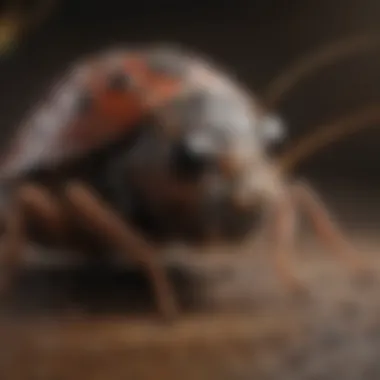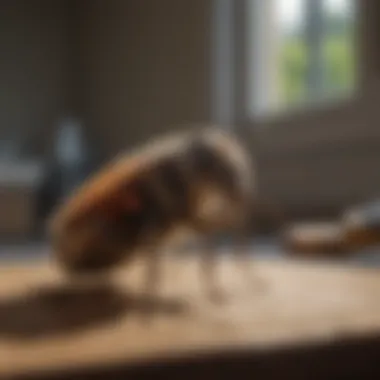Understanding Exterminator Services in Indian Trail


Intro
Exterminator services play an essential role in maintaining the comfort and safety of homes in Indian Trail, North Carolina. As pests continue to adapt and thrive, understanding their behavior and the services available to manage them becomes crucial. This article delves into the intricacies of pest identification, preventive methods, and control strategies, offering insights for homeowners seeking effective pest management.
Understanding the Pest
Knowledge about pests begins with accurate identification. Recognizing the specific types of pests invading a home is the first step towards addressing the issue. Common household pests in Indian Trail include ants, termites, cockroaches, and rodents. Each of these pests has its own unique features, habits, and potential health risks.
Identification
Effective pest control hinges on proper identification. For instance, several ant species may invade homes. Understanding the differences between them helps in selecting the right control methods. Homeowners should look for signs of infestation, such as droppings, nests, or chewing marks. Utilizing resources like Wikipedia can also provide additional insights.
Life Cycle
Pests have distinct life cycles that influence their behavior and the timing of their infestations. Recognizing these stages can enhance control efforts. For example, understanding that termites undergo a nymph phase helps in understanding their potential for damage. Homeowners should be aware of these stages to inform their pest control strategies.
Pest Prevention Strategies
Preventing a pest problem is often more effective than trying to eliminate one. Exterminators advise several strategies to deter pests before they become a nuisance.
Environment Modification
Altering the home environment can significantly reduce the chances of pest invasions. This includes:
- Sealing entry points like cracks and gaps.
- Reducing clutter that may provide hiding spots.
- Maintaining a clean environment, especially in kitchens.
Physical Barriers
Physical barriers can provide an additional line of defense against pests. Installing screens on windows, using door sweeps, and setting up baits can help to block pests from entering a home. These measures are straightforward yet effective.
Control Methods
Even with the best preventive measures, infestations can still occur. When they do, understanding different control methods is vital.
Chemical Control
Chemical treatments involve the use of pesticides to eliminate pests. Exterminators often apply these substances in a targeted manner to minimize harm to non-targeted organisms and the environment. Careful application and following safety guidelines are essential.
Biological Control
Biological control leverages natural predators or pathogens to manage pest populations. This method is considered eco-friendly as it reduces reliance on chemical pesticides. For example, introducing ladybugs can control aphid populations.
"A comprehensive pest management approach is often the best way to ensure long-term solutions."
Summary
The Importance of Pest Control Services
Pest control services play a critical role in maintaining the health and safety of homes and businesses. Understanding the importance of these services can help homeowners make informed decisions about pest management. In Indian Trail, North Carolina, a region with diverse ecosystems, effective pest control is essential to protect both personal property and community health.
Why Extermination Matters
Extermination matters for several reasons. First, it helps to prevent pest infestations which can lead to severe disruptions in daily life. Infestations can compromise the comfort of a home and pose a threat to its structural integrity. Pests such as termites can cause extensive damage behind walls and under floors, often going unnoticed until significant harm is done.
Second, pest control services address the growing threat of pests carrying pathogens. For example, rodents and insects can transmit diseases that affect humans and pets alike. By engaging a professional exterminator, homeowners not only tackle existing problems but also take preventive measures to ensure their residences remain pest-free.
Health Risks Associated with Pests
The presence of pests can lead to multiple health risks that affect the well-being of occupants. Common household pests such as cockroaches and mice are known carriers of allergens and diseases. Cockroach droppings can exacerbate asthma in children, while mice can spread hantavirus. An effective pest control service diminishes these health risks, ensuring a safer environment.
Additionally, untreated infestations can contribute to psychological stress. The constant worry about health issues and property damage can take a toll on mental health. Knowing that pest management is being handled professionally provides peace of mind to homeowners.


The Economic Impact of Pest Infestations
Pest infestations also have significant economic implications. The damage caused by pests can lead to high repair costs that may not be initially obvious. For instance, termite-inflicted damage can require extensive repairs, often running into the thousands of dollars.
Moreover, pest control can influence the resale value of a home. Potential buyers may hesitate to invest in a property with a history of pest problems. This can lead to financial setbacks for homeowners. Investing in pest control not only prevents such crises but also creates long-term savings.
In summary, recognizing the importance of pest control services is a step toward safeguarding health, maintaining property values, and achieving peace of mind. Properly managed pest control is an investment in both a safe home environment and a stable economic future.
Common Pests Found in Indian Trail, NC
In the realm of pest control, understanding the common pests found in Indian Trail, North Carolina, is crucial for homeowners. Knowledge of these pests facilitates early identification and prompt action, preventing more significant infestations. Each type of pest presents unique challenges and health implications. The ability to recognize specific pests allows homeowners to choose appropriate control measures, ensuring a safer and healthier living environment. This section will explore various pests typically encountered in the region, offering insight into identification and control strategies.
Ants: Identification and Control
Ants are among the most prevalent pests in Indian Trail. They often invade homes in search of food and shelter. Identifying the species of ant is vital as it influences control measures. Common species include the carpenter ant, which can damage wood structures, and the odorous house ant, known for a strong smell when crushed.
Control methods typically involve sanitation and baiting. Keeping the kitchen and pantry clean helps deter ants. Bait stations can attract and poison worker ants, effectively reducing the colony’s size.
Rodent Intrusions: Signs and Solutions
Rodents like rats and mice are another common issue. Signs of rodent infestations include droppings, gnaw marks, and nests made from shredded materials. Their presence poses health risks, as they can carry diseases.
Immediate action is crucial upon spotting signs of rodents. Traps and bait stations can be effective. It is equally important to seal entry points to prevent future intrusions. Maintaining a tidy landscape also discourages rodent activity.
Termites: Detection and Prevention
Termites are notorious for causing structural damage in homes. They can go undetected for long periods as they often infest areas not visible. Signs include mud tubes on walls and hollow-sounding wood. Regular inspections and monitoring are essential for early detection.
Preventive measures include maintaining a barrier between soil and wood, reducing moisture around the foundation, and regular inspections by professionals. Effective treatment can involve bait systems or liquid applied insecticides, emphasizing the importance of professional intervention.
Bed Bugs: Understanding and Managing Infestations
Bed bugs have become increasingly problematic, causing discomfort and sleep disturbances. These pests are small, brown, and can hide in mattresses, bed frames, and furniture. Recognition of an infestation often comes from bites or stains on bedding.
Management involves a thorough cleaning, high-heat treatments, and sometimes insecticides specifically designed for bed bugs. Pests can be elusive, so repetition of treatments may be necessary. Consequently, professional services often yield better results in managing bed bug issues.
By understanding these common pests and their characteristics, homeowners in Indian Trail can take effective measures to control and prevent infestations.
Selecting an Exterminator in Indian Trail
Choosing the right exterminator is a critical step for any homeowner facing pest issues. In Indian Trail, North Carolina, this selection process involves various factors that can significantly affect not just the immediate problem, but also the long-term solution. A professional pest control service should not only address current infestations but also prevent future occurrences. It is essential to understand the elements to consider when selecting an exterminator.
What to Look For in a Pest Control Company
When evaluating pest control companies, there are several key aspects to consider. First and foremost, check for licensing and certifications. Valid licenses ensure that the company meets local and state regulatory standards.
Next, consider the methods of pest control they utilize. Companies that employ integrated pest management techniques often prove more effective and environmentally-friendly. Additionally, a clear outline of services offered should be available, detailing their expertise in managing various types of pests.
Another crucial factor is experience. Look for companies that have a solid background in pest control. Readily available testimonials can guide your decision making. Moreover, it’s also wise to see if they can provide a inspection before treatment. This can help in creating a tailored pest management plan for your home.
Questions to Ask Potential Exterminators
Asking the right questions is vital when interviewing exterminators. Here are some important inquiries:
- How long have you been in business?
- What types of pests do you specialize in?
- Can you provide references from recent clients?
- What methods do you use for pest elimination?
- What safety precautions do you take?
- Do you offer follow-up services?
These questions will help delineate the competency of a company and its commitment to responsible pest management practices. An effective exterminator should be willing and able to answer these questions in detail, demonstrating their proficiency and dedication to customer service.
Evaluating Customer Reviews and References
Customer reviews and references are valuable resources when selecting an exterminator. Online platforms such as Facebook and Reddit often contain firsthand accounts from previous clients. Note the frequency of both positive feedback and complaints. A pattern of grievances can reveal flaws in services offered or customer service approaches.
References provided by the exterminator should generally align with online reviews. A deep dive into both can clarify expectations and ensure you are making an informed choice.


Methods of Pest Control Utilized by Exterminators
Understanding the methods of pest control is essential for homeowners seeking effective solutions to pest-related issues. Each technique offers distinct benefits and potential side effects, making it crucial to know when and how to use them. Proper pest management not only targets immediate infestations but also helps in the long-term prevention of future problems. A comprehensive grasp of these methods can empower homeowners to make informed decisions when dealing with pest control professionals.
Chemical Treatments: Efficacy and Safety
Chemical treatments are among the most common pest control solutions used by exterminators. This approach involves the application of pesticides to eliminate pests effectively. One significant advantage of chemical treatments is their speed; they often provide immediate results, significantly reducing pest populations quickly.
However, safety is a primary consideration. It is vital to choose treatments that do not pose health risks to humans or pets. Modern pesticides are formulated with safety regulations in mind, but it is still essential to follow instructions carefully. Always discuss with the exterminator to understand the chemicals being used, their impact, and any precautions to take during the treatment process.
"Understanding the chemical composition of pesticides can significantly affect the safety and efficacy of pest control solutions."
Biological Control: Using Natural Predators
Biological control involves leveraging natural predators to manage pest populations. For instance, ladybugs may be used to control aphid infestations in gardens. This method is often seen as environmentally friendly since it avoids the use of synthetic chemicals.
While effective, biological control strategies require a deeper understanding of ecological interactions. It is essential to identify the right predator for the specific pest issue. Moreover, the timing of introducing these natural predators is critical. They must be released when pests are present in sufficient numbers to ensure their effectiveness. Homeowners should consult pest control experts who specialize in biological methods for the best outcomes.
Integrated Pest Management (IPM): A Comprehensive Approach
Integrated Pest Management (IPM) represents a holistic strategy that combines multiple methods for effective pest control. This approach focuses on pest prevention first and uses the least harmful methods when necessary. IPM includes practices such as habitat modification, biological controls, and chemical treatments as a last resort.
The strength of IPM lies in its comprehensive nature. By addressing the root causes of pest problems while also considering environmental impacts, IPM provides sustainable pest management solutions. Homeowners adopting IPM strategies often see reduced reliance on chemicals, lower costs in the long term, and improved pest control efficacy. It is advisable to engage professionals familiar with IPM principles to design a tailored plan that aligns with specific needs and conditions.
Employing these pest control methods enhances the overall management of pest problems in residential areas, providing options that cater to diverse situations and preferences. Homeowners in Indian Trail, NC can benefit significantly from understanding these techniques as they seek a balance between efficacy, safety, and environmental responsibility.
Eco-Friendly Pest Control Solutions
The increasing demand for pest control services has raised awareness about environmentally friendly practices. Understanding eco-friendly solutions matters because they provide an alternative to traditional methods that may pose health risks. Homeowners today seek effective pest management while minimizing chemical exposure. Eco-friendly approaches not only protect the environment but also promote sustainable living practices.
Understanding Eco-Friendly Practices
Eco-friendly pest control practices focus on using methods and materials that are safe for humans and the environment. Integrated Pest Management (IPM) is a key concept in this regard. This approach seeks to control pests through a combination of biological, cultural, and physical methods, alongside minimal chemical use. For example, maintaining clean surroundings, sealing entry points, and implementing habitat modifications can significantly reduce pest populations.
Another aspect to consider is the selection of less harmful pesticides. These may include natural substances sourced from plants or minerals, which break down easily without leaving toxic residues. Additionally, using pest-resistant plants can deter infestations in gardens and landscapes.
The Role of Essential Oils in Pest Management
Essential oils have gained recognition for their effectiveness in repelling pests. Specific oils like peppermint and lavender possess strong scents that deter ants, mosquitoes, and other unwanted insects. Moreover, essential oils can serve as a safer alternative to conventional chemical repellents. While efficacy can vary, many homeowners have found essential oils useful in creating an unpleasant environment for pests without harmful side effects.
When using essential oils, dilution is essential. Mixing them with carrier oils or water can enhance application while ensuring safety. Incorporating essential oils into pest management routines can support a more natural approach to keeping homes pest-free.
Preventive Measures for Sustainable Living
Sustainable living goes hand in hand with preventive pest control measures. Homeowners should actively engage in practices that minimize pest attraction. Here are some effective strategies:
- Regular cleaning: Keeping living spaces clean and food properly stored limits access to pests.
- Proper waste disposal: Secure trash bins and avoid leaving waste exposed outdoors.
- Landscaping choices: Choose plants that are native and resilient to local pests, reducing dependence on chemical treatments.
- Moisture control: Fix leaks and ensure proper drainage, as moisture attracts pests.
By integrating these practices, homeowners can create an environment that naturally discourages pest infestations while promoting a healthier habitat for themselves and the surrounding ecosystem.
Eco-friendly pest control is not just a trend; it’s a commitment to preserving natural resources and ensuring safer living conditions.
Prioritizing eco-friendly pest control solutions enhances the overall quality of life while effectively managing pest problems. Through education and proactive steps, homeowners in Indian Trail can embrace more sustainable approaches in their pest management efforts.
Legal and Regulatory Considerations in Pest Control
Understanding the legal and regulatory landscape surrounding pest control services is crucial for homeowners in Indian Trail. This segment highlights the key components of pest management that ensure compliance and safeguard public health. Regulatory considerations are not only about fulfilling legal obligations; they also foster trust and confidence between the exterminators and the community.
Licensing and Certification Requirements
In many states, including North Carolina, pest control businesses require specific licenses to operate. Licensing represents a legal assurance that the exterminator possesses the necessary knowledge and skills to manage pest issues effectively. To maintain a license, exterminators often must undergo training and pass exams that cover various pest management techniques, as well as safety regulations.


This ensures that companies use appropriate methods to handle infestations without endangering residents or the environment. For homeowners, it is advisable to verify the credentials of any pest control service before hiring. Look for evidence of certification and ask about their training.
- Key Licensing Features:
- Proof of completed training programs.
- Regular updates on pest management practices.
- Adherence to safety standards.
Environmental Regulations Affecting Pest Control Practices
Environmental regulations play a vital role in how pest control practices are implemented. The Environmental Protection Agency (EPA) sets standards for pesticide use to minimize risks to people and the environment. In Indian Trail, pest control companies must comply with these guidelines, which dictate how pesticides are to be stored, handled, and applied.
Infringement of these regulations can result in severe penalties, including fines and loss of license. Therefore, exterminators must stay updated on regulations and best practices. For homeowners, being aware of these regulations can assure that the pest control services utilized are both safe and compliant.
"Adhering to environmental regulations is paramount for pest control companies. It assures clients that their health and the environment is prioritized."
Homeowners should inquire about the types of chemicals that exterminators use and their potential effects on both health and the environment. Understanding these regulations can aid users in making informed decisions regarding pest management providers.
- Benefits of Environmental Compliance:
- Reducing harmful exposure to chemicals.
- Supporting sustainable pest control methods.
- Enhancing the reputation and reliability of pest control companies.
In summary, lawful and environmentally conscious pest control services are essential for maintaining a healthy living space. As homeowners navigate through pest management options, understanding these legal considerations will ensure they make choices that protect their home and community.
Educating the Community on Pest Management
Educating the community on pest management is crucial to ensure that homeowners can address pest issues effectively. Knowledge empowers individuals to recognize infestations early, which often leads to more favorable outcomes when dealing with pests. Through education, residents of Indian Trail, NC can understand not only the signs of pest activity but also the potential health risks and economic implications associated with unchecked infestations. The community's awareness can significantly improve pest control efforts, leading to a healthier living environment.
Workshops and Resources for Homeowners
Workshops designed specifically for homeowners can be an effective way to share valuable pest management knowledge. These workshops typically cover various topics, such as pest identification techniques, preventive measures, and safe pest control methods. Resources like brochures, online seminars, and instructional videos also provide weekly education opportunities.
Homeowners can learn how to inspect their homes regularly for signs of pests, such as droppings or structural damage. Education in preventive strategies, like sealing gaps and ensuring proper waste disposal, can further hinder pest infestations. Additionally, local pest control experts can present case studies during workshops, showcasing successful methods applied in similar homes.
Some benefits of these workshops include:
- Building awareness of common pests in the region.
- Encouraging community engagement in pest prevention.
- Providing reliable contacts and resources for professional help when needed.
Collaboration with Local Schools and Organizations
Collaborating with local schools and organizations strengthens community education about pests. Schools can integrate pest management topics into their educational programs, offering lessons on the biology of common pests and their impacts on health and property.
Moreover, partnerships with community organizations can help host events focused on gardening and sustainable practices. Encouraging sustainable gardening can reduce pest populations naturally.
Examples of collaboration could include:
- Hosting lectures for students and parents on eco-friendly pest control.
- Creating community gardens, demonstrating sustainable practices while educating on pests that may affect these gardens.
- Establishing pest control awareness days in conjunction with local community events.
Engaging with schools fosters a culture of understanding and respect for our environment, promoting sustainable practices that remain beneficial in pest control.
In summary, educating the community about pest management through workshops and school collaborations creates a well-informed public able to tackle pest issues proactively. By focusing on awareness and practical solutions, homeowners can contribute to a healthier living space and community.
Future Trends in Pest Control
The evolution of pest control services is crucial for keeping pace with the ever-changing environment. As homeowners in Indian Trail, NC, face recurrent pest problems, understanding the future trends in pest control becomes essential. The insights provided here illuminate advancements and strategies that enhance the efficiency of extermination services. With an emphasis on technology and sustainable practices, these trends are pivotal for effective pest management.
Advancements in Pest Control Technology
Technology continues to shape the field of pest control in profound ways. Innovative approaches, such as the use of smart traps and monitoring systems, allow pest control professionals to track infestations in real-time. This leads to more precise treatments and minimizes the use of chemicals.
- Smart Traps: These devices can detect and capture pests automatically, sending alerts to homeowners and exterminators when traps are activated. They reduce the response time in addressing infestations.
- Drones: Drones are increasingly used to survey large properties for pest hotspots and monitor the effectiveness of treatments from above.
- Data Analytics: Utilizing data analytics helps exterminators to predict pest movements and behaviors based on historical data, enabling preemptive actions.
These advancements not only improve the effectiveness of pest control measures but also reduce environmental hazards associated with traditional treatments, offering a more efficient solution for households.
The Growing Importance of Sustainability in Pest Management
Sustainable practices in pest control are gaining significant traction due to heightened awareness of environmental issues. As homeowners prioritize eco-friendly options, pest control companies are adapting their strategies accordingly.
- Biological Control: This method incorporates natural predators to reduce pest populations. For example, introducing ladybugs to control aphids is a sustainable approach that aligns with ecological principles.
- Reduced Chemical Use: Many exterminators are minimizing the application of harsh chemicals. This shift not only protects local wildlife but also decreases the risk of adverse health effects in households.
- Integrated Pest Management (IPM): This holistic approach combines various management practices to minimize pest damage while being environmentally responsible. It involves monitoring pest levels, using resistant plant varieties, and encouraging beneficial insects.
Adopting these sustainable methods results in safer living environments and reflects a broader commitment to maintaining ecological balance. Homeowners in Indian Trail, NC, are finding that these practices not only assist in pest control but also promote sustainability, aligning with modern values.







